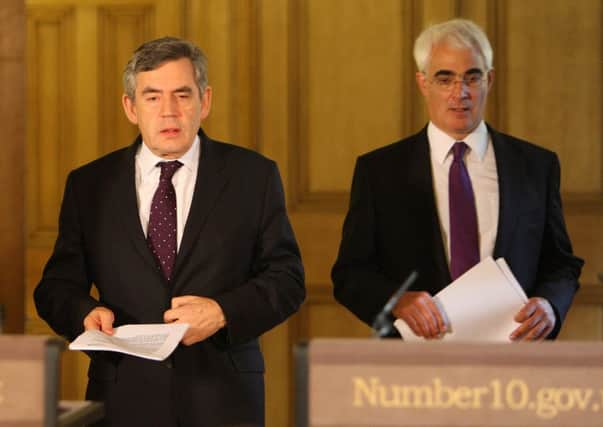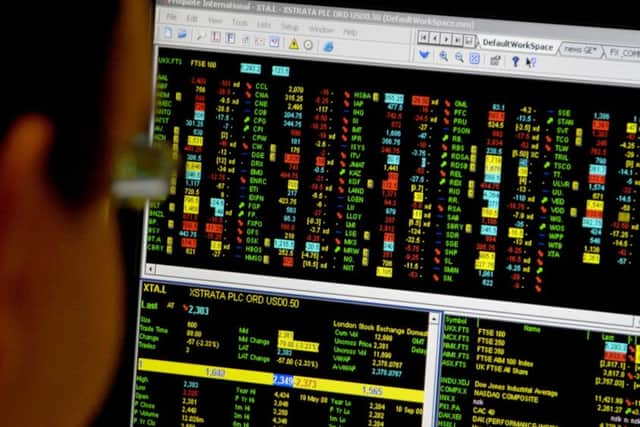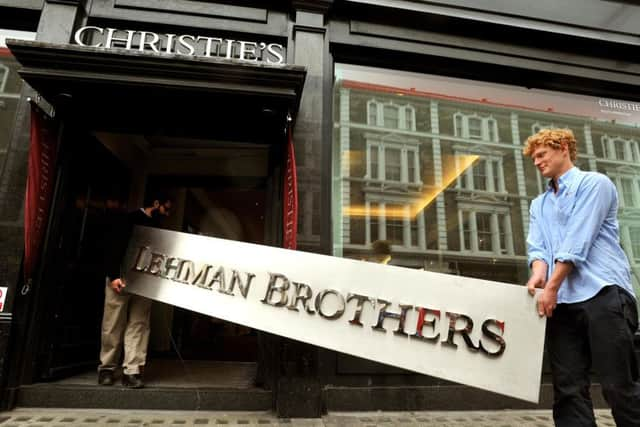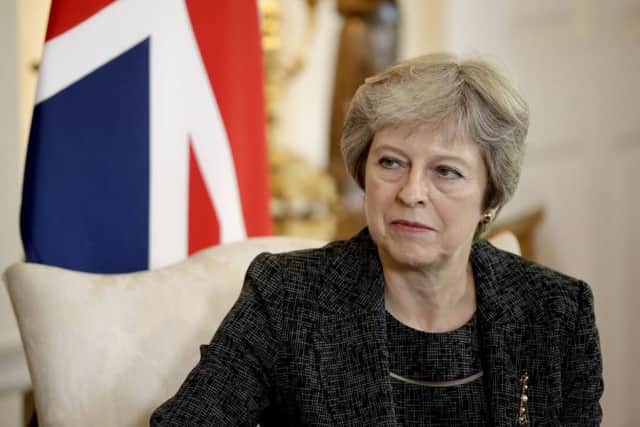Mark Stuart: Why populism is the legacy of the financial crash and a decade of austerity


Quickly, the storm spread to Britain, as the then Labour government was forced to mount a massive £500bn bailout of three of Britain’s biggest banks: Royal Bank of Scotland, HBOS and Lloyds TSB.
As Alistair Darling, the normally placid Chancellor of the Exchequer reflected on the eve of the bank rescue plan: “I don’t believe in panicking before it’s absolutely necessary, but I came close to considering it.”
Advertisement
Hide AdAdvertisement
Hide AdMeanwhile, as Gordon Brown walked into his office on the morning of the bailout, he did not know whether he would still be Prime Minister by the end of the day.


All of a sudden, a long period of uninterrupted economic growth came to an abrupt end, and with it a prolonged spending spree by the Blair and Brown governments.
New Labour were swept from power, and as Ministers handed over to the incoming Tory and Lib Dem coalition in 2010, one, Liam Byrne, the outgoing Chief Secretary to the Treasury, revealed the stark truth: “I’m afraid there is no money.”
The new coalition offered voters a diet of austerity. At first, a majority of voters seemed to tolerate the idea, believing that perhaps there was some ‘dead wood’ in Whitehall departments or in local town halls that needed cutting away. The architect of austerity, Chancellor George Osborne, pedalled the line, which some voters initially swallowed, that he was merely clearing up Labour’s mess.
Advertisement
Hide AdAdvertisement
Hide AdHowever, few expected austerity to last as long as it did. Wages began to stagnate, and as the full effects of the financial crisis became apparent, the public began to let out their anger on Britain’s leading bankers, including Sir Fred ‘the Shred’ Goodwin, the former chief executive of Royal Bank of Scotland whose excessive severance and pensions package shocked many. The general perception was that ordinary people were suffering for the mistakes of others, and yet no-one had been held accountable.


Increasingly, British voters began venting their growing frustration by backing insurgent, anti-establishment parties, most notably with the rise of the United Kingdom Independence Party (Ukip). Across the Western world, politics experienced a period of extraordinary voter volatility.
In Scotland, the Scottish National Party (SNP) came perilously close to winning the 2014 independence referendum and then a year later, Jeremy Corbyn was elected leader of the Labour Party. The unexpected had started to happen.
Austerity had ushered in an age of extremes, amplified by social media, leaving moderates everywhere marginalised.
Advertisement
Hide AdAdvertisement
Hide AdBy the summer of 2016, the European Union gave voters, angered by continued austerity, an ideal opportunity to give the establishment another kicking. Ordinary people, who had not voted for over a decade, came out of the housing estates in Yorkshire and elsewhere to register their protest.


Meanwhile, this volatile pattern was replicated across the Atlantic with the unexpected election of Donald Trump as US President, and in the rise of populist parties across continental Europe, mostly recently in Germany and now in Sweden, formerly a beacon of liberal values.
With living standards falling, people across Europe starting casting around for people to blame. Migrants streaming into Europe from war-torn countries like Syria, were singled out as scapegoats. The concept of globalisation, so worshipped by politicians in the 1980s and 1990s, seemed tarnished as a growing group of workers – known as the ‘just about managing’ or (‘JAMs’) – struggled to make ends meet.
The new Prime Minister, Theresa May, thought she could appeal to the disillusioned working class by calling an early general election in 2017 on the issue of Brexit. However, quickly, the campaign morphed into a debate about continued austerity, as people saw at first hand cuts to their school’s budget and the severe pressures on their local NHS hospital.
Advertisement
Hide AdAdvertisement
Hide AdCleverly, Labour’s election leaflets reflected voter concerns about these cuts to local services, while Jeremy Corbyn successfully rebranded Labour as an anti-establishment party which promised to hold the rich and powerful to account and end austerity.
And when the Manchester Arena and the London Bridge terrorist attacks interrupted the election campaign, instead of the Conservatives triumphing on their traditionally strong area of security and terrorism, public attention focused on cuts to police numbers, presided over by Mrs May when she was Home Secretary. Austerity had come back to bite the political establishment in the face.
Since the election, the public has looked on with growing anger at the severe spending constraints being imposed on local government, the police and transport services, particularly in the North.
Ten years on, the 2008 financial crash has cast a long, dark shadow over Britain’s economic and political landscape. Ordinary people have had to endure a decade of gruel.
Advertisement
Hide AdAdvertisement
Hide AdThey long for political leadership, but it does not look like a fractured Conservative Party is capable of delivering that. Perhaps a future Labour government can bridge the Brexit divide, casting aside austerity policies that have so manifestly failed.
If neither main party succeeds, then the way may be open for a right-wing populist party to exploit a divided Britain. In such volatile times, we have to anticipate the unthinkable if we are to avoid it.
Mark Stuart is a political academic from York. He has written biographies of John Smith and Douglas Hurd.